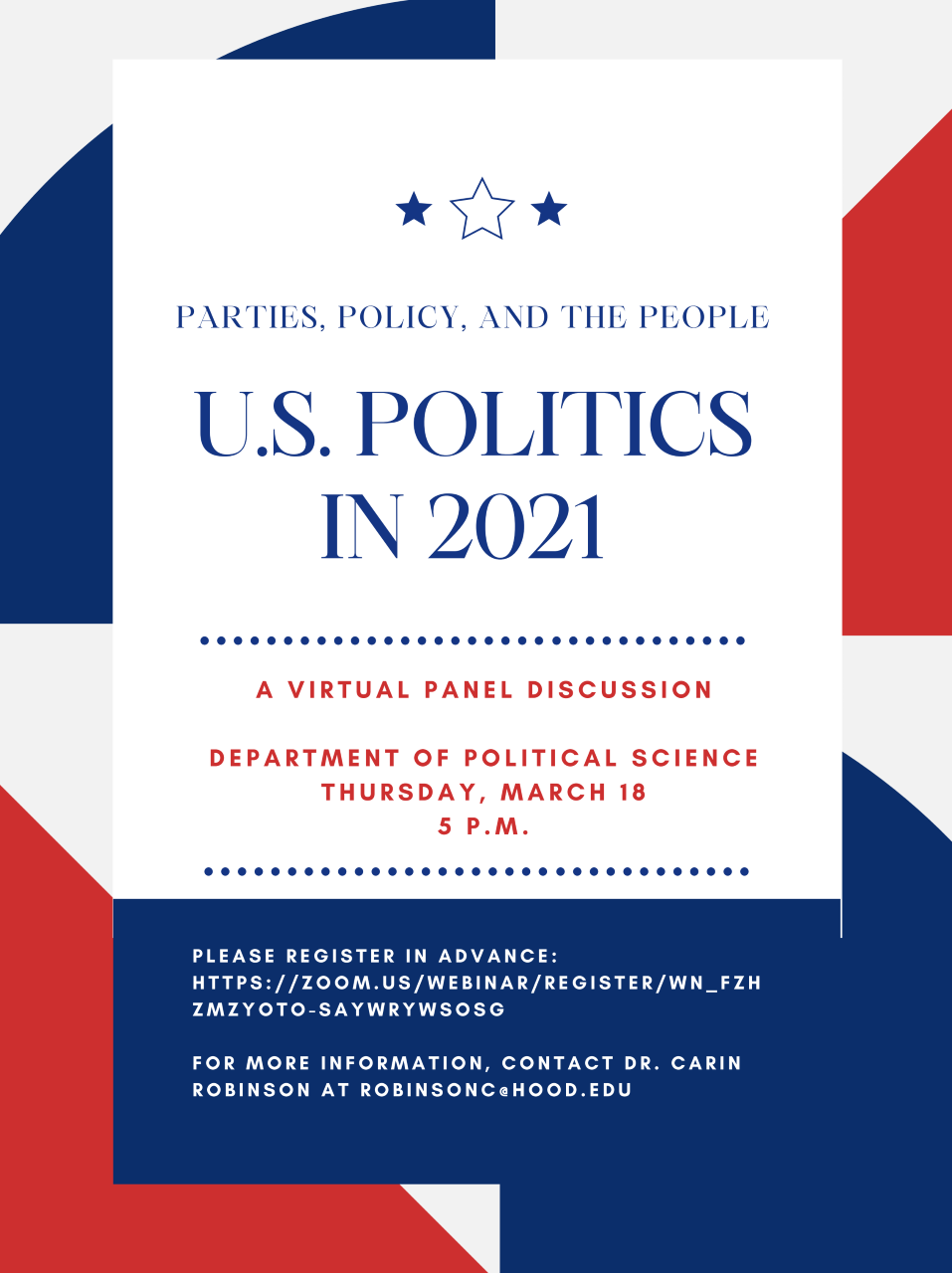
By Jacob Russell//
2020 was a very unusual year.
The worldwide pandemic took the lives of millions, ravaging economies and destroying families. Crime numbers skyrocketed, police brutality cases soared, and protests for social justice engulfed the planet.
Amid all of this, perhaps the most polarizing election in U.S. history took place. Claims of rigged voting, counterfeit ballots, and a stolen presidential election culminated in a Jan. 6 insurrection taking place in the U.S. capitol, which ultimately failed.
But not before endangering the lives of hundreds of people and ending the lives of five.
So, where does America go from here? How has the country changed, and are these changes for the better? Is the current political climate a sign of things to come, or can the polarization change course?
On Thursday, March 18, Hood College’s Department of Political Science hosted a Zoom webinar panel discussion about U.S. politics in 2021 to discuss these very same issues.
The panelists consisted of three Hood political science professors: Tamelyn Tucker-Worgs, Paige Eager, and Cairn Robinson. Professor Katherine Robiadek served as the meeting’s host.
Eager, an expert on international relation and U.S. foreign policy, explained how one of the Biden administration’s first goal was to rejoin many of the agreements and organizations from which the Trump administration had withdrawn the U.S.
“We have the Paris Climate Accord…the United Nation’s Human Rights Council…the World Health Organization, these are all groups that Biden has had America rejoin,” Eager said.
Eager went on to explain that there are still certain foreign commitments that the Trump administration made that Biden’s team is still deciding whether they will uphold. Perhaps most notably is the decision to withdraw all American troops from Afghanistan by May 1.
Eager presumes that much of U.S. relations between China, Russia, Iran, and North Korea will remain mainly unchanged. “Even though the tone has changed somewhat on China from the Biden administration, I don’t think a lot of the policies will change significantly,” Eager said.
Robinson provided audience members with an introspective look into how political parties have changed since the 2020 election.
“Party identification remains the single best predictor of vote choice,” Robinson said. “There was no mass exodus of moderate Republican voters, as some suspected there would be.”
There was a presumption that moderate Republicans would distance themselves from Trump because of his conduct as president, but this didn’t happen. Likely due to the concept that has rooted itself in American politics that Robinson described as “team mentality.”
“Our partisanship is a largely psychological and sociological phenomenon. I am of one party like I am a fan of the Green Bay Packers, it’s because I’m part of a team,” Robinson said. “What defines and divides us is not that I disagree with you on foreign or economic policy, it’s that I was raised differently from you.”
The team mentality that Robinson described can be seen in the studies that found 64% of GOP voters would join a Make America Great Again party if Trump started one.
Tucker-Worgs used her time to discuss the multitude of factors that prompted the record voter turnout experienced in the 2020 election.
Voter turnout increased in every single state during the past election, ranging from a 2% increase all the way up to 14%. “We saw curbside or drive-thru voting, an increase in no excuse absentee voting and in mail-in ballot distribution, and date expansion for early voting,” Tucker-Worgs said.
Tucker-Worgs also went on to discuss the “get out the vote” movements led by Black people that contributed to Biden winning states that Democrats haven’t won in decades.
“Stacey Abrams’ efforts, the Black Voters Matter fund and the Souls to the Polls movement helped educate, protect, and transport black voters to polls,” Tucker-Worgs said. “But this high voter turnout was not magic.”
Much of the turnout, especially in Georgia, Tucker-Worgs noted, came from Black churches viewing the act of voting as much more than a civic duty. It was an act of religious and moral conscience, an act made to ensure that future Black children won’t have to face the same hardships their parents and grandparents faced.
The meeting ended on a high note, wherein all the panelists explained that despite how 2020 was full of trials and tribulations, hope can be gleamed from the sorrow of the past year.
Tucker-Worgs shared a recent quote from newly elected Georgia Senator Rev. Raphael Warnock. “A vote is a kind of prayer. Voting is talking about and reflecting upon how we want the world to be.”




Be the first to comment